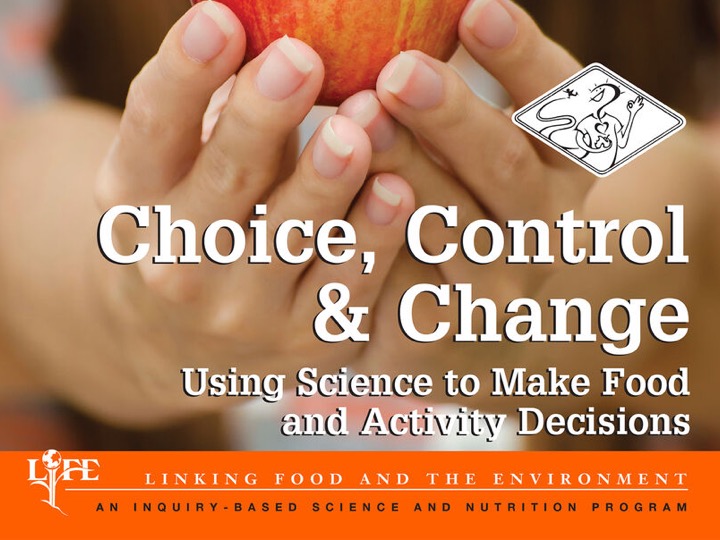The Choice, Control & Change trial was developed to determine if a standards-based curriculum could be effective at changing students’ “energy balance related behaviors” (i.e. food and physical activity behaviors) to ultimately decrease obesity risk. The curriculum served as a replacement for a required 7th grade science unit on “dynamic equilibrium."
C3 is a 20-lesson theory-based curriculum that utilizes both social cognitive theory and self-determination theory. The inquiry-based science lessons explore key questions such as, “How can we use scientific evidence to help us maintain energy balance?” Students participate in activities such as measuring out teaspoons of sugar in common sweetened beverages and then assessing how sugar can build up in our blood causing type two diabetes if we take in too many total calories and do not engage in enough physical activity. Students also set personal goals and monitor their progress attaining their goals, discussing triumphs and challenges and working together to increase confidence and success.
The C3 trial took place during the 2006-2007 school year and involved 10 New York City middle schools, matched in pairs that were similar in terms of ethnicity/race of students, percent of students who qualified for free or reduced price lunch, and academic achievement levels of students. One school in each pair was randomly assigned to receive C3 and the other to receive the standard science curriculum on dynamic equilibrium. The students who received C3 got around 30 total sessions (many lessons took multiple sessions to complete) over 3 months. Students who received C3 reported drinking fewer sweetened beverages, eating fewer snacks such as chips, candy, and packaged baked goods, and eating healthier options at fast food restaurants. They also increased walking for exercise and decreased recreational screen-time.
During the dissemination phase in 2007-09 the curriculum was taught in several sites in Michigan, in Hayward, CA, and in Philadelphia, PA, and an implementation trial in Michigan showed similar results to the NYC trial.
Related Publications:
Choice, Control & Change: Using Science to Make Food and Activity Decisions is the third book of the LiFE curriculum series. Choice, Control & Change: Using Science to Make Food and Activity Decisions is the third book of the LiFE curriculum series.
Gray HL, Contento IR, Koch P, DiNoia J. Mediating Mechanisms of Theory-Based Psychosocial Determinants on Behavioral Changes in a Middle School Obesity Risk Reduction Curriculum Intervention, Choice, Control, and Change. Child Obesity. 2016;12(5):248-259.
Gray HL, Contento IR, Koch P. Linking Implementation Process to Intervention Outcomes in a Middle School Obesity Prevention Curriculum, ‘Choice, Control and Change’. Health Education Research.2015;30(2):248-261.
Lee H, Contento IR, Koch P. Using a Systematic Conceptual Model for a Process Evaluation of a Middle School Obesity Risk-Reduction Nutrition Curriculum Intervention: Choice, Control & Change. Journal of Nutrition Education and Behavior. 2013;45 (2):126-136.
Mallya A, Mensah FM, Contento IR, Koch P, Calabrese-Barton A. Extending Science Beyond the Classroom Door: Learning From Students’ Experiences With the Choice, Control & Change (C3) Curriculum. Journal of Research in Science Teaching. 2012; 49(2):244-269.
Contento IR, Koch P, Lee H, Calabrese-Barton A. Adolescents Demonstrate Improvement in Obesity Risk Behaviors After Completion of Choice, Control & Change (C3), a Curriculum Addressing Personal Agency and Autonomous Motivation. Journal of the American Dietetic Association. 2010;110(12):1830-1839.
Related Abstracts:
Sauberli W, Lee H, Contento IR, Koch P. Enhancing Personal Agency and Competence in Eating and Moving: An Outcome Evaluation of Choice, Control, and Change (C3), an Inquiry-Based Middle School Science Curriculum to Reduce Obesity Risk. Journal of Nutrition Education and Behavior.2008:40(4 Supplement): S36
Contento IR, Koch P, Lee H, Sauberli W, Calabrese-Barton A. Enhancing Personal Agency and Competence in Eating and Moving: Formative Evaluation of a Middle School Curriculum, Choice, Control, and Change. Journal of Nutrition Education and Behavior. 2007;39(5 Supplement):S179-S186.
Lee H, Contento IR, Sauberli W, Koch P, Calabrese-Barton A. Using Science Education to Move Middle Schoolers toward More Healthful Food and Activity Choices: An Outcome Evaluation of Choice, Control, & Change (C3). Journal of Nutrition and Education Behavior. 2007;39(4 Supplement):S96.
The development, evaluation, and dissemination of Choice, Control & Change was funded by a National Institutes of Health Science Education Partnership Award and extra online resources were funded by a stimulus grant.
